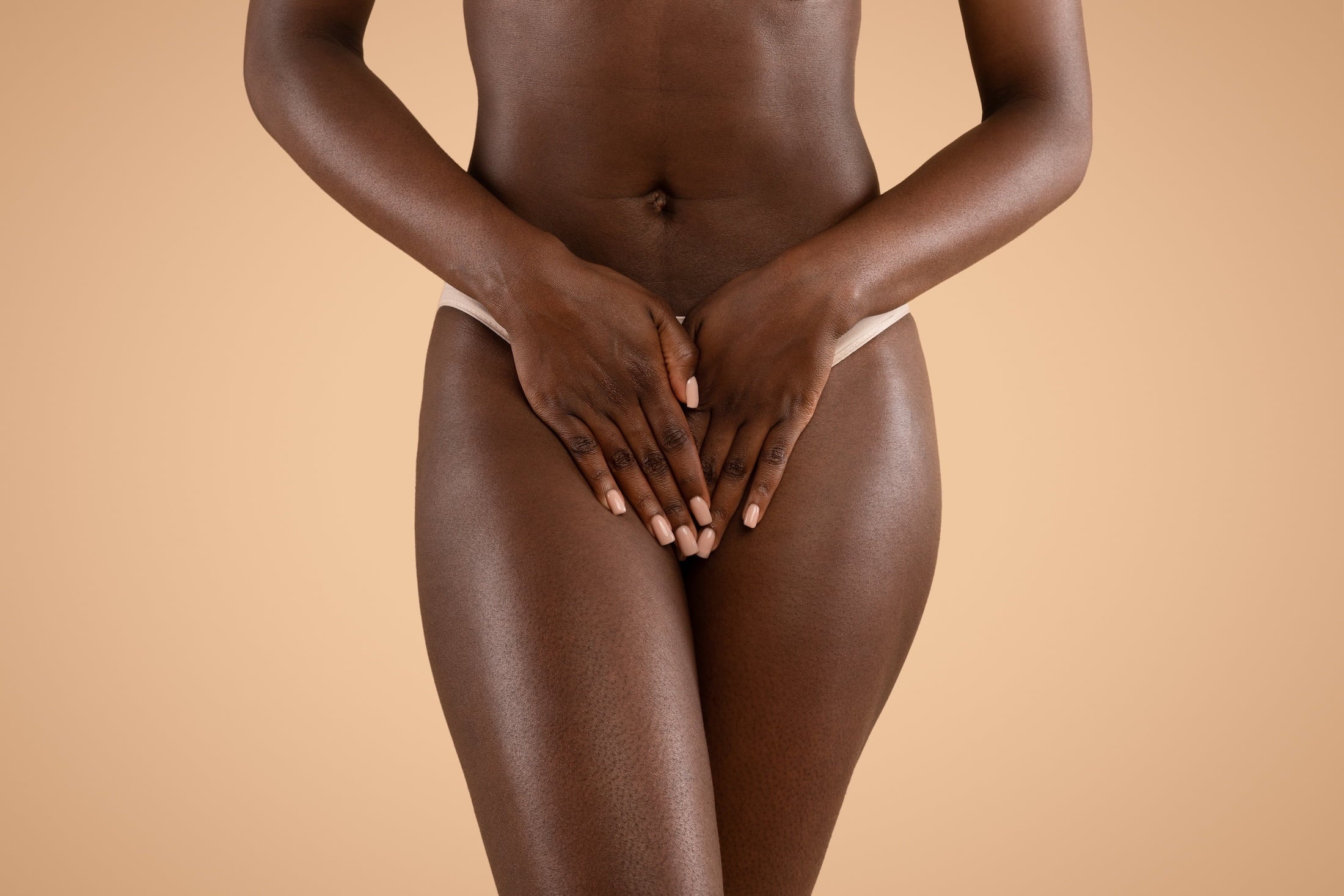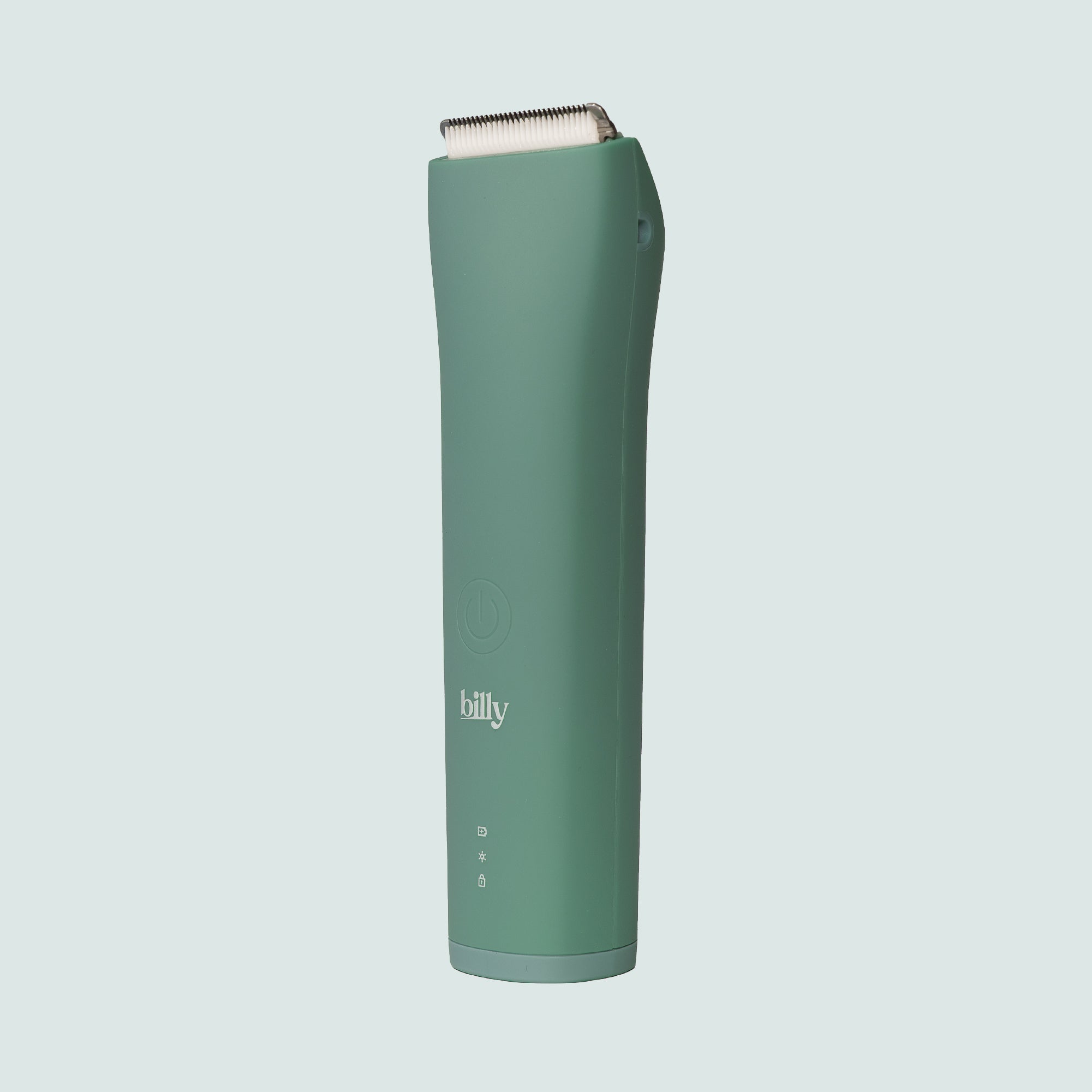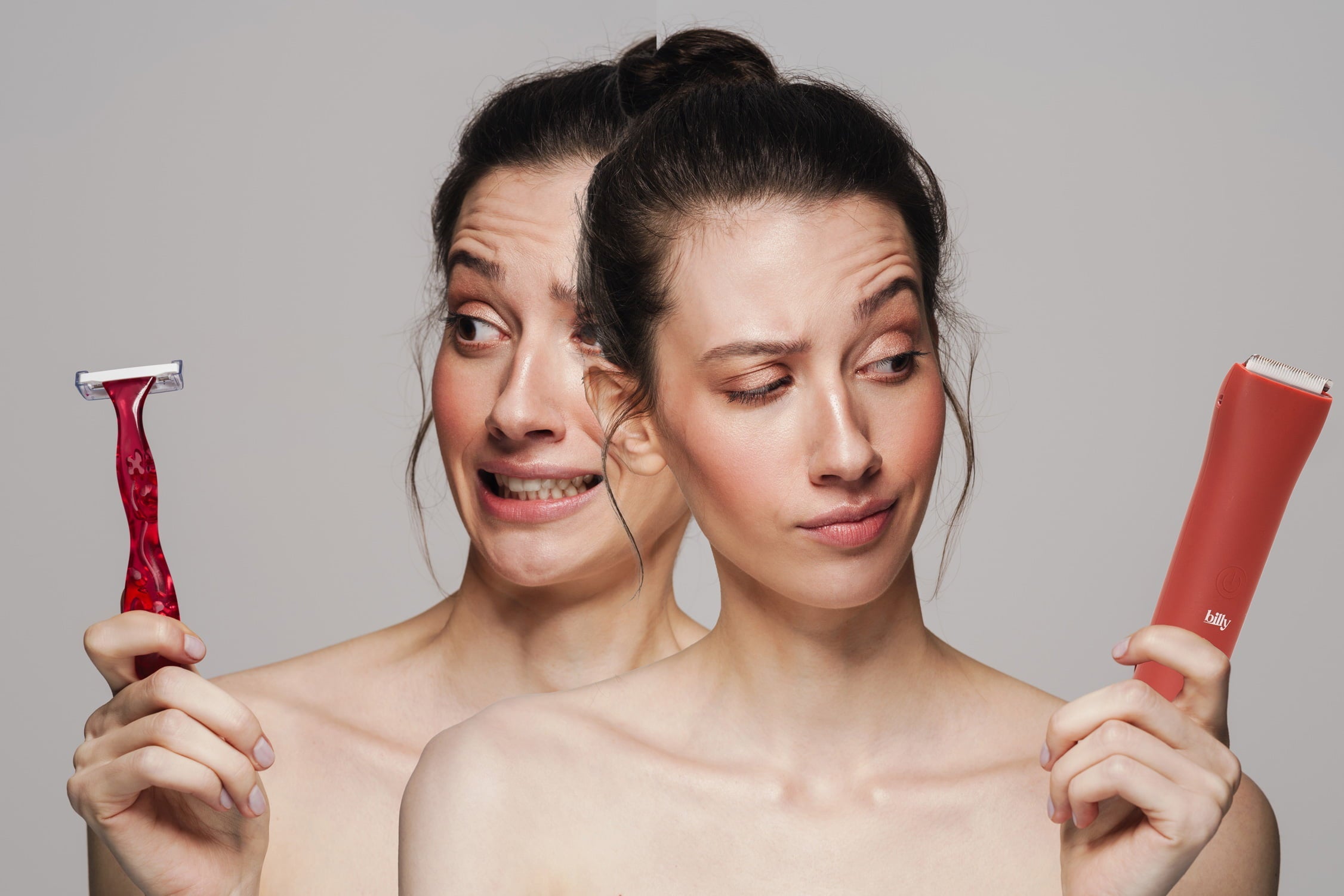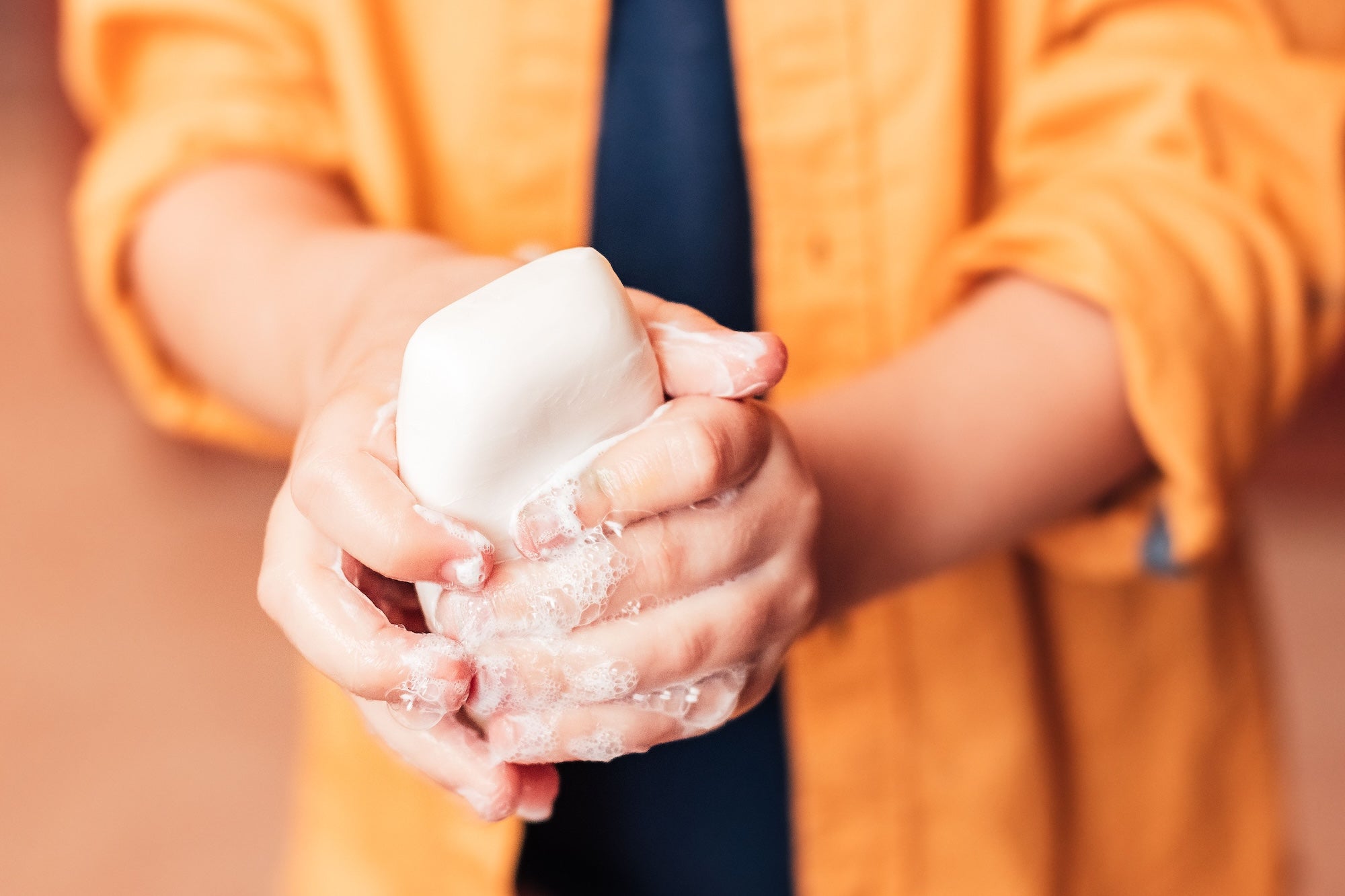We're going to talk about a topic that concerns everyone: ingrown pubic hairs. These small red dots that appear in the intimate area can really ruin your daily life. In 2025, it's time to understand and manage this specific problem!
What exactly is an ingrown pubic hair?
Pubic hair is naturally thicker and often curly, making it particularly prone to ingrown hairs. Instead of growing straight, they curl under the skin, creating those infamous red and sometimes painful bumps.
The Most Affected Areas
For Women
- The mons pubis (especially after shaving too closely)
- Groin folds (where friction is constant)
- The bikini area (especially with tight underwear)
For Men
- The base of the penis (area of high friction)
- The testicles (very thin and sensitive skin)
- The groin crease (daily friction)
Why Do You Have Ingrown Hairs?
The truth is, our personal hygiene habits aren't always the best. Here are some common mistakes that contribute to these minor inconveniences:
- You shave too close (we know, it's tempting, but it's really not a good idea)
- You are using unsuitable equipment (forget the rusty emergency razor)
- Your clothes are too tight (let it breathe!)
- Dead cells accumulate on your skin (a little exfoliation from time to time doesn't hurt)
- Your skin lacks hydration (yes, even then you need to hydrate)
In summary, the most common causes of ingrown hairs:
- Shaving too close to the skin
- Use of unsuitable equipment
- Clothes that are too tight
- The accumulation of dead cells
- Insufficiently hydrated skin
Why is the Pubis More Concerned?
The pubic area is particularly prone to ingrown hairs for several reasons:
- The hair there is naturally thicker and curlier
- The area is warm and humid (bacteria paradise)
- Friction is constant there.
- The skin is more sensitive there than elsewhere
- Underwear creates a confined environment
Ingrown Hairs, Prevention: Essential Steps
You know the saying "an ounce of prevention is worth a pound of cure"? This is especially true when it comes to ingrown hairs. Here's how to take care of your intimate area to avoid these minor inconveniences.
The Basics for Top-Notch Skin
Taking care of your skin isn't just about your face! Your intimate area also deserves your full attention:
- A gentle scrub 1 to 2 times a week (we said gentle, not stripping!)
- Good hydration every day with a suitable cream
- Clothes that let your skin breathe (yes, even your favorite super-tight jeans)
- Underwear that fits well but is not compressive - find the right balance
The ABCs of a Successful Shave
If you really want to use a classic razor (even if we recommend other options), here are the golden rules to follow:
- Choose a quality razor specially designed for intimate areas
- Change your blade regularly (dull blades are your worst enemies)
- Always follow the direction of the grain (resist the temptation to do the opposite)
- Don't look for an ultra-close shave at all costs.
- Always use a suitable shaving gel or cream (water alone is a no-no)
Pro tip: A trimmer specifically for intimate areas, like Billy's, allows you to avoid most of these hassles while minimizing the risk of ingrown hairs. But we're here to advise you, whatever your preferred method!
For Skin Care
- Gently exfoliate the area 1 to 2 times a week
- Moisturize daily with non-comedogenic products
- Favor clothes that let the skin breathe
- Avoid tight underwear
For Shaving
- Use a suitable, sharp razor
- Change the blade regularly
- Always shave with the grain
- Avoid shaving too close to the skin
- Apply a suitable shaving gel or cream
Natural Solutions
Natural Remedies That Prove Their Work
So, the ingrown hair is already here? Don't panic, nature has more than one trick up its sleeve. Here are some gentle solutions that can really help:
- Hot compresses: a bit like a mini spa for your skin
- The green clay mask: your detox ally
- Essential oils: sparingly and well diluted (we're not here to turn your intimate area into a potpourri)
- Diluted hydrogen peroxide: for local and delicate application
Daily Care
To speed up healing, a few simple actions can make a difference:
- Regular hydration (your skin will thank you)
- A very gentle exfoliation (we emphasize the "gentle")
- Well-chosen vegetable oils
- Soothing lotions without alcohol
If it gets serious, when should I consult?
It is important to consult a healthcare professional if:
- Inflammation persists for more than 48 hours
- The area becomes very painful
- Signs of infection appear
- Ingrown hairs are recurrent
Medical Treatments
Well, we're just telling you this for information, but above all, if necessary, ask your pharmacist or your doctor what you should do, that's what they're there for, so don't be afraid (and don't let a little shame hold you back, they've seen and heard much worse ;) )
Over-the-Counter Treatments
- Special soothing creams
- AHA lotions (it stings a little but it works)
- Glycolic acid products
- Mild antiseptics
Direction Doctor If:
- It's been hurting for over 48 hours
- The area is really red and swollen
- You have a fever
- It keeps coming back despite your efforts
- Or if you have the slightest doubt that something abnormal is happening
For your information, here are the types of treatment that exist:
Over-the-Counter Treatments
- Specific soothing creams
- AHA Lotions
- Glycolic acid products
- Mild antiseptic solutions
Prescription Treatments
- Cortisone creams
- Retinoid creams
- Antibiotics if infection
- Specific dermatological care
When an ingrown hair becomes more than just an inconvenience
Although most ingrown hairs eventually resolve on their own, some can develop into more serious complications:
Folliculitis: An infection of the hair follicle that manifests as small, red, and sometimes pus-filled bumps. Most common in warm, moist areas such as the pubic area.
Hair cysts: An ingrown hair can sometimes form a cyst under the skin. It's a small, fluid-filled sac that can become painful, especially in sensitive areas.
Abscesses: In the most severe cases, an infection can develop and form an abscess. It's rare, but when it happens, it's really not fun. If you notice a painful, hot, and swollen lump, don't wait to seek medical help.
Scarring: By constantly scratching or trying to remove ingrown hairs yourself (we all know how tempting it is), you risk creating permanent scars. Not ideal for such a private area!
Hyperpigmentation: Repeated inflammation can leave darker marks on the skin, particularly visible on dark or olive skin.
What method should you choose to avoid ingrown hairs?
Not all intimate care methods are created equal when it comes to ingrown hairs. Here's what you need to know to make the right choice:
Waxing: It pulls out the hair by the root, which may seem effective, but be careful - the backlash is often painful! Regrowth can easily become ingrown, especially in areas with thin skin like the groin.
The manual razor: The classic, but also the champion of ingrown hairs. Shaving too close to the skin is the number one enemy of smooth regrowth. If you really want to, don't forget to respect the direction of the hair growth and use a good gel.
Depilatory creams: These dissolve the hair at the surface of the skin. They are effective but can sometimes irritate sensitive areas. Ingrown hairs are less likely to occur than with a razor, but the risk remains.
The classic trimmer: Better than a razor for preventing ingrown hairs, but still too risky in such delicate areas. The blades are not suitable for the thin skin of the intimate area.
The special trimmer for intimate areas (like Billy): Designed to leave the ideal hair length to prevent ingrown hairs. Billy's ceramic blade is specially designed to avoid cutting too close to the skin while still giving a clean result.
The Billy clipper: an anti-ingrown hair philosophy
The best prevention is to adapt your personal grooming method. When the Billy was created, ingrown hairs were a real problem, which is why we use a blade specially designed to prevent ingrown hairs. That way, when you shave your pubic area with the Billy, there's no risk of ingrown hairs!
How does it work? It's simple, as we told you above, ingrown hairs often come from shaving too close to the skin, the shaved hair ends up under the skin and risks being trapped underneath when it grows back: bam, ingrown hair. So, we have a blade that leaves a mini length of hair above the skin, so there's no chance of it growing back as an ingrown hair.
In Conclusion
Ingrown pubic hairs aren't inevitable. With proper care and a tailored preventative approach, they can be effectively avoided. If they do occur, there are many solutions to treat them quickly and avoid complications. Don't worry, it's happened to everyone ;)
Ingrown Hair FAQ
Can ingrown pubic hairs go away on their own?
Yes, most ingrown hairs eventually resolve on their own within a few days if you avoid further irritating the area. But why suffer when you can prevent them?
Can the same treatments be used for ingrown pubic hairs as for ingrown leg hairs?
Not really. Pubic skin is much more sensitive and thin. What works on your legs might make you see stars (and not in a good way) if you apply it to your intimate areas. Always opt for products specifically formulated for sensitive areas.
Do men and women have the same risk of ingrown hairs in the intimate area?
Both are affected, but men often have thicker, curlier hair, which increases the risk. However, women generally use more radical hair removal methods (waxing, full-body waxing), which balances out the statistics.
Do cotton underwear really reduce the risk of ingrown hairs?
Absolutely! Cotton allows the skin to breathe and reduces moisture, which can lead to ingrown hairs. In 2025, with all the technical fabrics available, opt for natural, breathable materials for your everyday underwear.
Does regrowth after using a clipper like billy cause fewer ingrown hairs?
That's exactly the principle! The Billy blade is designed to cut the hair at the perfect height to prevent it from growing back. Not too long, not too short: just perfect.
Should you avoid shaving your private parts during pregnancy?
Absolutely! During pregnancy, your skin is even more sensitive and prone to irritation. If you're serious about maintaining the area, opt for a trimmer like Billy's, which minimizes the risk of irritation and ingrown hairs. And honestly, with everything your body's already going through, make it easier on yourself!
How to avoid itching after shaving your private parts?
Post-shave itching is often caused by micro-cuts and irritation. With a trimmer like Billy's, you can significantly reduce this risk. After trimming, apply a soothing, alcohol-free lotion and wear cotton underwear. And above all, resist the urge to scratch, even though you know it's difficult!
Can trimming between the buttocks cause ingrown hairs?
This delicate area is particularly prone to ingrown hairs due to constant friction. The Billy was designed for these tricky spots! Its special blade and built-in LED allow you to see exactly what you're doing, even in the most inaccessible corners, while minimizing the risk of ingrown hairs.
How to shave your testicles without risking ingrown hairs?
Testicles, with their thin, wrinkled skin, are a real challenge! The main trick is to use a specific trimmer like a billy instead of a conventional razor. Gently stretch the skin to make it smoother as you trim, and then apply a soothing, unscented lotion. Your family jewels will thank you!
Can ingrown hairs appear even after using clippers?
This is much less likely than with a razor, but it can happen if the setting is too short. The advantage of Billy is that its blade is specifically designed to cut at the ideal height, which prevents ingrown hairs while still giving a clean result. If you have particularly sensitive skin, use the 3mm comb for even gentler maintenance.
Are chemical exfoliants (AHA/BHA) really safe for the pubic area?
Let's not kid ourselves: what's good for your face isn't necessarily good for your intimate areas! Chemical exfoliants can be effective against ingrown hairs, but they should be used sparingly and in low concentrations on these sensitive areas. And always, always test on a small area first. If you feel it getting too hot, rinse immediately!
Can you use the intimate trimmer during your period?
Absolutely! The Billy is 100% waterproof, making it easy to clean. For more comfort, wait until the lightest days of your cycle. Bonus: Many people find that caring for this area during their period can help reduce odor and improve freshness.
Can ingrown hairs cause sexually transmitted infections?
No, ingrown hairs themselves don't cause STIs. But be careful: the tiny lesions caused by ingrown hairs can create entry points for infections during sexual intercourse. One more reason to take care of your intimate area with the right equipment like the billy!
How to maintain your intimate area when you are a beginner?
Start with the Billy clipper with the longest comb (12mm) to get used to the feel. Take your time, use a mirror, and take advantage of the built-in LED to see what you're doing. Remember, there's no rush—it's better to go gradually than to rush and risk irritation. Once you're comfortable, you can reduce the length to your liking.
Are there any essential oils that are truly effective against ingrown pubic hairs?
Some oils like tea tree, lavender, or tea tree have anti-inflammatory and antibacterial properties that can help. But be careful: ALWAYS dilute them (1-2 drops in a teaspoon of vegetable oil) before applying to this ultra-sensitive area. And if you feel the slightest tingling, rinse thoroughly. Honestly, for intimate areas, we prefer to recommend gentler solutions!






















Share on your networks: